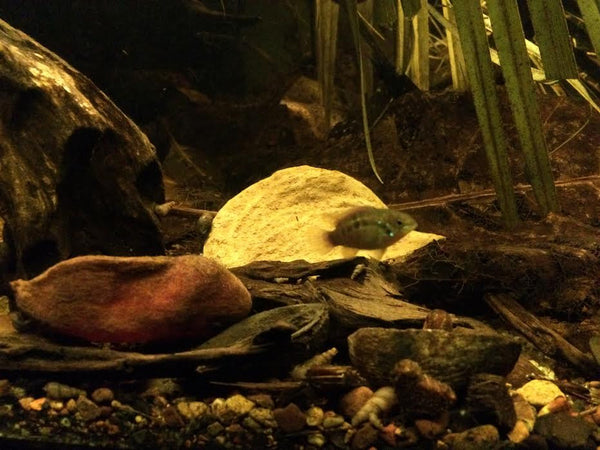- Continue Shopping
- Your Cart is Empty
The "plant thing" evolves: Asking the right questions...All part of our "mental shift."

We're noticing more and more evolution of ideas within the blackwater/botanical-style aquarium world, as well as from the more "mainstream" hobby as a whole, and it's getting really interesting!

One of the things I'm seeing a lot more of is a desire among hobbyists who have not played with this stuff before to create "blackwater"-like conditions in all types of aquariums. I have received many PM's and emailed from hobbyists who would like to see a "tinted" version of their tank; however, they're not quite ready to embrace the decomposing leaves and botanicals full-bore.
This is perfectly cool to me, because it signifies the first real "mainstream breakthrough" in terms of the overreaching "aesthetic" of blackwater. Just having say, a planted tank enthusiast who happens to keep dwarf cichlids, tetras, or Rasbora interested in seeing a "tinted" version of their tank is a "mind set shift" that is remarkable, given that it wasn't that long ago that "blackwater" was seen as "dirty", "chemically unstable", and "limiting" by many so-called "Mainstream" hobbyists.
It will probably take longer for many of these people to appreciate the aesthetics of decomposing leaves, botanicals, and biofilms...but the real shift has started.
Again, I remind you that you can always employ a "reactor" to utilize botanicals as a "media" if you really don't like the aesthetic of these materials in your display. It also serves to keep the tint at an aesthetic level that you enjoy (not to mention, in an environmentally stable situation as well). We're seeing more and more hobbyists concerned with how to do this, as they're employing great husbandry (i.e.; frequent water changes) and want to keep the conditions consistent.
I've fielded a number of questions and seen several discussions on how to prepare your makeup water to have similar conditions to the display (in terms of "tint" and the physical characteristics which accompany it).
Now, that being said, we're seeing a significantly greater interest in "enriched" substrates from the community, as well as from some hobbyists who have "migrated" here from the planted tank world, and they're very interested about incorporating botanical materials into their displays.
It's early days yet, but at least one of these individuals confided in me that he feels that the value of having these materials in the display, imparting some of the tannins and other organics into the water may significantly outweigh any of the "perceived deficits" to plants that have been one of the main hesitations many serious planted tank enthusiasts have had about playing with blackwater.

In other words, we're seeing experimentation with blackwater from serious, "hardcore" aquatic plant enthusiasts- something which was almost unthinkable a year or two ago. Hobbyists are letting go of some of the long-held dogma and at least giving this stuff a shot instead of simply dismissing it as a novelty, or unsuitable for their purposes. One of the single biggest reasons for this "mental shift" is the acknowledgement that a captive "blackwater" system and its environment is somewhat different from the wild blackwater habitats, which are largely devoid of minerals and nutrients which spur plants. However, the interest in the "active botanical substrate" idea, in particular, is spurring new experimentation.

And the recognition by several of these enthusiasts that light penetration is thought by science to be one of the main reasons why aquatic plants and algae are less prominent in wild blackwater systems, yet can be compensated for by more intense LED lighting commonly employed in captivity anyways is very intriguing to hear! In other words, there's a broader recognition that our tanks are more natural in some respects than many other "methodologies" used in the hobby, but they are still closed systems and behave- can behave- differently than the wild habitats they might resemble. It's now being actively explored which other means are best employed to "compensate" for any environmental "shortcomings" as related to aquatic plants in the blackwater aquarium.
Just hearing these hobbyists postulate that there might be simple ways to compensate, and that the possible benefits might outweigh the "deficits" is remarkable! It's about greater understanding, patience, and the application of "finesse" by the hobbyist.

It's a recognition that, not only do we NOT have all the answers about just how good a blackwater/botanical-style aquarium can function- we're just getting to the point where we can ask more pointed questions about the idea! We're just beginning to scratch the surface on this. We've seen the obvious benefits for many fishes (coloration, health, spawning behavior)- we're now seeing experienced hobbyists taking the first tentative steps into experimenting more seriously with blackwater conditions for plants. We're hearing discussion on everything from the chemical composition of blackwater aquariums to the idea of "leaf mulch" being looked at differently.
Now, it may ultimately be that, in general they simply don't do as well in blackwater aquariums...We might, however, get further insights into which plants can benefit from them, and how to accomplish creating conditions that work for them within the context of the blackwater/botanical-style aquarium.

We are seeing greater interest in identifying which plants actually do grow better in the types of conditions we work with in our blackwater aquariums (i.e.; Cryptocorynes, etc.). This builds on what is already known and has been accomplished. And just the fact that serious plant enthusiasts are even playing with this stuff is a tribute to the sharing of work and ideas that YOU- our "Tint Nation" have done! Inspiring hobbyists from other hobby "disciplines" is an amazing thing that will benefit many.
Exciting times. Fascinating discoveries. Spectacular successes. Crushing failures. Shared experiences. "Mental shifts." They've all been a part of our journey so far, and will continue to propel the blackwater/botanical-style aquarium "movement" into the future.
Stay bold. Stay open-minded. Stay progressive. Stay unchained by dogmatic thinking...
And most importantly...
Stay Wet.
Scott Fellman
Tannin Aquatics














Scott Fellman
Author